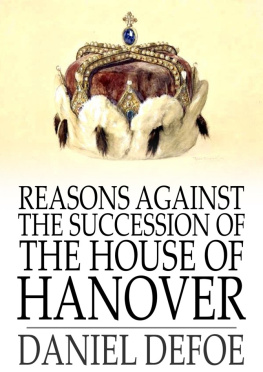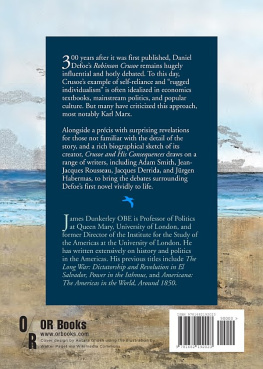Reasons Against the Succession of the House of Hanover, with an Enquiry
*
What strife is here among you all? And what a noise about who shall or shall not be king, the Lord knows when? Is it not a strange thing we cannot be quiet with the queen we have, but we must all fall into confusion and combustions about who shall come after? Why, pray folks, how old is the queen, and when is she to die? that here is this pother made about it. I have heard wise people say the queen is not fifty years old, that she has no distemper but the gout, that that is a long-life disease, which generally holds people out twenty, or thirty, or forty years; and let it go how it will, the queen may well enough linger out twenty or thirty years, and not be a huge old wife neither. Now, what say the people, must we think of living twenty or thirty years in this wrangling condition we are now in? This would be a torment worse than some of the Egyptian plagues, and would be intolerable to bear, though for fewer years than that. The animosities of this nation, should they go on, as it seems they go on now, would by time become to such a height, that all charity, society, and mutual agreement among us, will be destroyed. Christians shall we be called! No; nothing of the people called Christians will be to be found among us. Nothing of Christianity, or the substance of Christianity, viz., charity, will be found among us! The name Christian may be assumed, but it will be all hypocrisy and delusion; the being of Christianity must be lost in the fog, and smoke, and stink, and noise, and rage, and cruelty, of our quarrel about a king. Is this rational? Is it agreeable to the true interest of the nation? What must become of trade, of religion, of society, of relation, of families, of people? Why, hark ye, you folk that call yourselves rational, and talk of having souls, is this a token of your having such things about you, or of thinking rationally; if you have, pray what is it likely will become of you all? Why, the strife is gotten into your kitchens, your parlours, your shops, your counting-houses, nay, into your very beds. You gentlefolks, if you please to listen to your cookmaids and footmen in your kitchens, you shall hear them scolding, and swearing, and scratching, and fighting among themselves; and when you think the noise is about the beef and the pudding, the dishwater, or the kitchen-stuff, alas, you are mistaken; the feud is about the more mighty affairs of the government, and who is for the protestant succession, and who for the pretender. Here the poor despicable scullions learn to cry, High Church, No Dutch Kings, No Hanover, that they may do it dexterously when they come into the next mob. Here their antagonists of the dripping-pan practise the other side clamour, No French Peace, No Pretender, No Popery. The thing is the very same up one pair of stairs: in the shops and warehouses the apprentices stand some on one side of the shop, and some on the other, (having trade little enough), and there they throw high church and low church at one another's heads like battledore and shuttlecock; instead of posting their books, they are fighting and railing at the pretender and the house of Hanover; it were better for us certainly that these things had never been heard of. If we go from the shop one story higher into our family, the ladies, instead of their innocent sports and diversions, they are all falling out one among another; the daughters and the mother, the mothers and the daughters; the children and the servants; nay, the very little sisters one among another. If the chambermaid is a slattern, and does not please, Hang her, she is a jade; or, I warrant she is a highflier; or, on the other side, I warrant she is a whig; I never knew one of that sort good for anything in my life. Nay, go to your very bed-chambers, and even in bed the man and wife shall quarrel about it. People! people! what will become of you at this rate? If ye cannot set man and wife together, nor your sons and daughters together, nay, nor your servants together, how will ye set your horses together, think ye? And how shall they stand together twenty or thirty years, think ye, if the queen should live so long? Before that time comes, if you are not reduced to your wits, you will be stark mad; so that unless you can find in your hearts to agree about this matter beforehand, the condition you are in, and by that time will in all likelihood be in, will ruin us all; and this is one sufficient reason why we should say nothing, and do nothing about the succession, but just let it rest where it is, and endeavour to be quiet; for it is impossible to live thus. Further, if Hanover should come while we are in such a condition, we shall ruin him, or he us, that is most certain. It remains to inquire what will be the issue of things. Why, first, if ye will preserve the succession, and keep it right, you must settle the peace of the nation: we are not in a condition to stand by the succession now, and if we go on we shall be worse able to do so; in his own strength Hanover does not pretend to come, and if he did he must miscarry: if not in his own, in whose then but the people of Britain? And if the people be a weakened, divided, and deluded people, and see not your own safety to lie in your agreement among yourselves, how shall such weak folk assist him, especially against a strong enemy; so that it will be your destruction to attempt to bring in the house of Hanover, unless you can stand by and defend him when he is come; this will make you all like Monmouth's men in the west, and you will find yourselves lifted up to halters and gibbets, not to places and preferments. Unless you reconcile yourselves to one another, and bring things to some better pass among the common people, it will be but to banter yourselves to talk of the protestant succession; for you neither will be in a condition to bring over your protestant successor, or to support him on the throne when you have brought him; and it will not be denied, but to make the attempt, and not succeed in it, is to ruin yourselves; and this I think a very good reason against the succession of the house of Hanover.
Another argument relates something to the family of Hanover itself. Here the folk are continually fighting and quarrelling with one another to such a degree as must infallibly weaken and disable the whole body of the nation, and expose them to any enemy, foreign or domestic. What prince, think you, will venture his person with a party or a faction, and that a party crushed, and under the power of their enemy; a party who have not been able to support themselves or their cause, how shall they support and defend him when he comes? And if they cannot be in a posture to defend and maintain him when they have him, how shall he be encouraged to venture himself among them? To come over and make the attempt here according to his just claim and the laws of the land, would be indeed his advantage, if there was a probability that he should succeed; otherwise the example of the king of Poland is sufficient to warn him against venturing while the nation is divided, and together by the ears, as they are here. The whole kingdom of Poland, we see, could not defend King Augustus against the Swedes and their pretender; but though he had the majority, and was received as king over the whole kingdom, yet it being a kingdom divided into factions and parties, and those parties raging with bitter envy and fury one against another, even just as ours do here, what came of it but the ruin of King Augustus, who was as it were a prisoner in his own court, and was brought to the necessity of abdicating the crown of Poland, and of acknowledging the title of the pretender to that crown. Now, what can the elector of Hanover expect, if he should make the attempt here while we are in this divided factious condition,while the pretender, backed by his party at home, shall also have the whole power of France to support him, and place him upon the throne?













